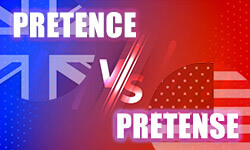
The global proliferation of the English language has led to the creation of an array of dialects, each characterized by its own set of pronunciation and spelling variations. In the realm of academic writing, striving for linguistic consistency is crucial to maintaining coherence and adhering to the principles of academic integrity. Among the various distinctions of British English vs. American English, spelling differences stand out significantly, like in the case of “pretence” and “pretense.”
Inhaltsverzeichnis
“Pretence” or “pretense”
“Pretence” and “pretense” are two variants of the same word and function as nouns in a sentence. Despite “pretence” only being accepted among Brits and “pretense” among Americans, both words have the same definition. “Pretence/pretense” describes an attempt to make something that is not the case appear true. It can refer to a façade or act put on to deceive others, or to a false claim or assertion made without basis in reality or supportive facts. The word can also describe a false display of feelings intentions, or attitudes. The only spelling variation in British vs. American English is the “c” or “s” as the second last letter.

British English
pretence

American English
pretense
Both spellings of the word “pretence/pretense” are correct; however, they are only accepted in their respective dialects. While “pretence” with a “c” at the end is the conventional spelling in British English, “pretense” with an “s” at the end is the conventional spelling in American English. It is crucial to keep uniformity in your paper, sticking to your chosen writing style. This also includes following only one dialect to maintain academic integrity and credibility.
Examples of using “pretence” and “pretense” as a noun
The word “pretence” or “pretense” merely functions as a noun in a sentence structure. The examples below illustrate their usage in the different English variants.
- British English: “Pretence”
- American English: “Pretense”


A related noun of the word “pretence” or “pretense” is “pretentiousness,” which refers to the quality of being pretentious. It describes a behavior or attitude characterized by an attempt to seem more important, worthy of admiration, or cultured than is actually the case. This typically involves displaying exaggerated talent, knowledge, or importance that a person does not truly possess. “Pretentiousness” has generally a negative connotation, suggesting insincerity and a lack of authenticity in one’s presentation. There is no differentiation between British and American spelling, as shown in the following examples.


“Pretence” or “pretense” as a verb
The verb form of the noun “pretence/pretense” is “to pretend” in both British and American English. There is no variation in spelling for this verb between the two variants of English, making it consistent across both dialects. The following examples show how to apply “to pretend” correctly in sentences.


“Pretence” or “pretense” in the “-ing” form
When the verb “to pretend” is inflected in its “-ing” form, it becomes “pretending” and implies a present participle or gerund in a sentence structure. The following sentences outline examples of using “pretending” in British and American English.
Present participle


Gerund


“Pretence” or “pretense” in the “-ed” form
The verb “to pretend” in the “-ed” form is “pretended and refers to the past tense or past participle of the word. There is not variation in British and American English and is applied in sentences as follows.
Past participle


Past tense


“Pretence” or “pretense” as an adjective
The adjective for “pretence/pretense” is “pretentious” and there is no spelling distinction between British and American English. The word “pretentious” describes something or someone attempting to impress by affecting greater importance, culture, status, or talent than is actually possessed.


“Pretence” or “pretense” as an adverb
As an adverb, the word becomes “pretentiously,” modifying an adjective, verb, or another adverb. The following sentences show examples of using “pretentiously” correctly in sentences.


FAQs
“Pretence” in British English and “pretense” in American English is the act of making an appearance of something that is not true. It involves giving a false impression or putting on a facade, often to deceive others or to create a particular image.
“Pretence” or “pretense” is a noun and can be applied as in the following example:
British English:
Under the pretence of needing help with her homework, she visited her friend’s house to spend time with him.
American English:
Under the pretense of needing help with her homework, she visited her friend’s house to spend time with him.
The phrase “keep pretence” refers to the act of continuing to maintain a facade, even in the face of evidence to the contrary or as situations change. It involves persisting in giving a false impression or acting as if something is true when it is not, usually to deceive others or to uphold a particular image for oneself or a situation.
Here is a list of 10 synonyms for the word “pretence” or “pretense”:
- Act
- Charade
- Facade
- Feigning
- Front
- Guise
- Masquerade
- Pose
- Show
- Simulation
